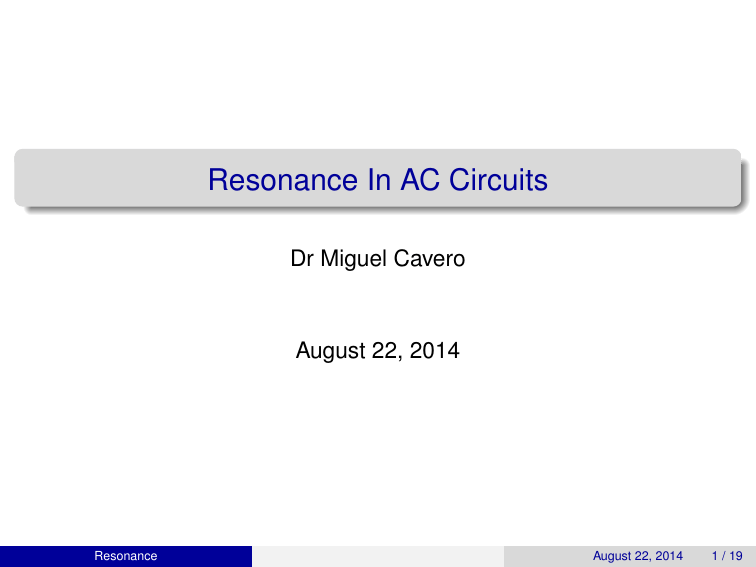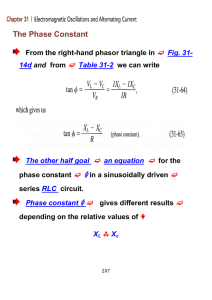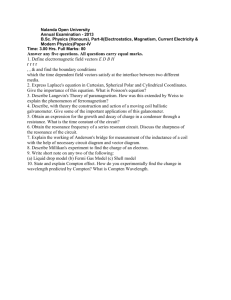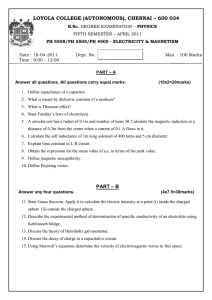EM18 - Physics at PMB
advertisement

Resonance In AC Circuits Dr Miguel Cavero August 22, 2014 Resonance August 22, 2014 1 / 19 AC Circuit Example A current in a series RL circuit is given by I = 8 cos(1000t) A where t is in seconds and R = 40 Ω and L = 30 mH. Calculate the (a) reactance and impedance, (b) the peak voltage across the RL combination, (c) the instantaneous voltage across the RL combination, (d) and the rms voltage across L. Resonance Recap August 22, 2014 3 / 19 AC Circuit Example A current in a series RL circuit is given by I = 8 cos(1000t) A where t is in seconds and R = 40 Ω and L = 30 mH. (a) Calculate the reactance and impedance. XL = ωL = (1000) × (30 × 10−3 ) = 30 Ω p p Z = R2 + (XL − XC )2 = 402 + 302 = 50 Ω Resonance Recap August 22, 2014 4 / 19 AC Circuit Example A current in a series RL circuit is given by I = 8 cos(1000t) A where t is in seconds and R = 40 Ω and L = 30 mH. (b) Calculate the the peak voltage across the RL combination. The peak voltage is V0 = I0 Z = 8 × 50 = 400 V Resonance Recap August 22, 2014 5 / 19 AC Circuit Example A current in a series RL circuit is given by I = 8 cos(1000t) A where t is in seconds and R = 40 Ω and L = 30 mH. (c) Calculate the the instantaneous voltage across the RL combination. The instantaneous voltage across the combination is V = V0 cos(ωt + α) What is α? tan α = Resonance XL − XC 30 = R 40 Recap August 22, 2014 6 / 19 AC Circuit Example A current in a series RL circuit is given by I = 8 cos(1000t) A where t is in seconds and R = 40 Ω and L = 30 mH. (d) Calculate the rms voltage across L. What is the peak voltage across L? V0L = I0 XL = 8 × 30 = 240 V The rms voltage is then VL 240 L Vrms = √0 = √ 2 2 Resonance Recap August 22, 2014 7 / 19 Frequency Depedence Recall that in an RLC circuit, the impedance Z depends on the frequency. s p 1 2 2 2 2 Z = R + (XL − XC ) = R + ωL − ωC The peak current and peak voltage in a circuit is given by the impedance: V0 = I0 Z V I √0 = √0 Z 2 2 Vrms = Irms Z Changing the angular frequency results in a change in the current. Resonance Resonace August 22, 2014 9 / 19 Frequency Depedence From the equation Vrms Z the current reaches a maximum value when the impedance is at a minimum. Since the impedance is the combination of resistance and reactance p Z = R2 + (XL − XC )2 Irms = it is a minimum when the inductive reactance is equal to the capacitative reactance. XL = XC ⇒ Z = R Resonance Resonace August 22, 2014 10 / 19 Resonant Frequency When the inductive reactance is equal to the capacitative reactance, ω0 L = ω02 = ∴ ω0 = 1 ωC 1 LC 1 √ LC where ω0 is the resonant frequency, which results in the minimum impedance. At resonance, the circuit is purely resistive (since Z = R). Clearly, the current in the circuit will be a maximum when the impedance is a minimum. Resonance Resonace August 22, 2014 11 / 19 Resonant Frequency A graph of current versus frequency for different resistors R1 and R2 (L and C are kept constant) shows that the current reaches a maximum when the frequency is ω0 . Resonance Resonace August 22, 2014 12 / 19 Resonant Frequency Since XL = ωL and XC = 1/ωC, when XL increases then XC decreases, and vice versa. At low frequencies, the circuit is more capacitative and at high frequencies the circuit is more inductive. Resonance Resonace August 22, 2014 13 / 19 Resonant Frequency In this graph R1 < R2 since, at every frequency, the current is greater through R1 . Resonance Resonace August 22, 2014 14 / 19 Resonant Frequency Irms = Vrms Vrms =q Z R2 + ωL − 1 2 ωC What happens at resonance if the resistance is zero? Resonance Resonace August 22, 2014 15 / 19 Metal Detectors A metal detector (for example in an airport) is essentially a coil with many turns. The frequency of the circuit is set to be the resonant frequency when there is no metal in the coil. Any metal that is placed inside the detector changes the effective inductance of the coil, therefore it changes the current in the circuit. An alarm is set to go off when a change in current is detected. Resonance Resonace August 22, 2014 16 / 19 Capacitor In An AC Circuit A series RLC circuit has resistance R = 150 Ω, inductance L = 20.0 mH, capacitance C and is connected to an alternating emf source of 20.0 V rms at 796 Hz. (a) Find the value for C for which the current is a maximum. (b) Hence, find the maximum rms current in the circuit. Resonance Resonace August 22, 2014 17 / 19 Capacitor In An AC Circuit A series RLC circuit has resistance R = 150 Ω, inductance L = 20.0 mH, capacitance C and is connected to an alternating emf source of 20.0 V rms at 796 Hz. (a) Find the value for C for which the current is a maximum. The resonant (angular) frequency is given by 1 ω0 = 2πf0 = √ LC The current is maximum at resonance, therefore the capacitance C at resonance is 1 √ f0 = 2π LC 1 C = 2 4π f02 L 1 = = ... F 2 2 4π (796) (20.0 × 10−3 ) Resonance Resonace August 22, 2014 18 / 19 Capacitor In An AC Circuit A series RLC circuit has resistance R = 150 Ω, inductance L = 20.0 mH, capacitance C and is connected to an alternating emf source of 20.0 V rms at 796 Hz. (b) Hence, find the maximum rms current in the circuit. What is the value of the impedance at resonance? At resonance, the circuit is purely resistive (there is no reactance). The rms current is Irms = Resonance Vrms Vrms 20.0 = = = ... A Z R 150 Resonace August 22, 2014 19 / 19


